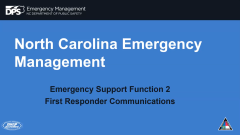Psychological First Aid (PFA) is an evidence-informed intervention for supporting people experiencing stress at any level to help reduce distress and foster adaptive coping strategies. PFA was designed initially to support people in the immediate aftermath of disasters, but its use expanded from the initial intent with the growing recognition of the benefits of PFA support in a range of stressful situations, from daily stressors to traumatic incidents. The approach is based on the understanding that people have predictable reactions to stress and that trauma is on the extreme end of the stress continuum. Most people will exhibit resiliency when stressed—this can be fostered and increased with information about early reactions to stress, encouragement to use existing coping skills, and providing a caring and compassionate presence.
Speaker: Judy Nicholson, LCSW and Tara S Hughes, LCSW-R
Judy began her mental health provider career somewhat later in life. The change came after having many and varied careers ranging from mill worker to producing graphics for television. Once through the education and licensing process, Judy became a psychotherapist. Her work and experience led her to a specialty in working with individuals who experienced trauma and secondary traumatic stress. She chose to work through public, local mental health clinics. But with the decrease in funding of this type of organization, Judy chose to continue to help children and adults in the private practice she built. Her clients included law enforcement professionals, active-duty men and women, teachers, other mental health workers, children, adults and seniors.
Judy joined the American Red Cross after having taken an intense two-day course entitled “Disaster Mental Health.” Her first assignment on a relief operation was after Hurricane Opal in Florida in 1995. It is estimated that Judy has completed approximately 100 DRO assignments, from Guam to Haiti. From small (Parsons Kansas tornado to large (Hurricane Katrina), and to nature-caused (Oklahoma Tornados) to person caused (Sandy Hook, 9-11).
Each client she has worked with and each DRO experience has been a privilege and an opportunity to learn.
Tara is the Director of the Bureau of Justice Assistance National Training and Technical Assistance Center (BJA NTTAC). She oversees the facilitation of training and technical assistance (TTA) for the criminal justice system, including law enforcement, violence prevention and the legal and court system. Her experience working with first responders, healthcare systems, schools and victim advocates allows her to lead her team to infuse trauma informed principles into the TTA that is provided, increasing positive relationships with communities.
Tara is a Subject Matter Expert in Mass Violence response and has worked directly with victims and families to ensure comprehensive care. She is previous Project Director of Improving Community Preparedness to Assist Victims of Mass Violence or Domestic Terrorism: Training and Technical Assistance Program (ICP TTA) which delivered TTA to local, state, regional, and tribal jurisdictions across the country, including U.S. territories, to augment existing emergency response plans to ensure effective protocols and strategies to address the immediate and long-term needs of victims, families, and first responders after incidents of criminal mass violence and domestic terrorism.
She has extensive experience working in mass violence/casualty incidents, with a focus on violence that impacts large numbers of people and whole communities. Tara uses her experience in trauma counseling and crisis response to ensure compassionate and effective care of people impacted by incidents. Her immediate response history encompasses a wide variety of incidents, including the crash of Colgan Air Flight 3407, Haitian earthquake, Newtown CT Sandy Hook school shooting, Boston Marathon Bombing, Orlando Pulse nightclub shooting, and October 1 Rt 91 Harvest Festival shooting in Las Vegas. Her long-term recovery work includes the Pittsburgh Synagogue shooting, Virginia Beach Municipal workplace shooting, the Gilroy, CA Garlic Festival shooting, the Buffalo, NY grocery store shooting.
Tara received her BA in Psychology from Boston College and Master of Social Work (MSW) and Family Therapy Certification from Boston University. Her clinical practice has focused on treatment of survivors of trauma, with a concentration on crisis/trauma response and family.
interventions. She has extensive experience working in communities where violence is the norm and has responded to a variety of community-wide traumatic events.
Psychological First Aid (PFA) is an evidence-informed intervention for supporting people experiencing stress at any level to help reduce distress and foster adaptive coping strategies. PFA was designed initially to support people in the immediate aftermath of disasters, but its use expanded from the initial intent with the growing recognition of the benefits of PFA support in a range of stressful situations, from daily stressors to traumatic incidents. The approach is based on the understanding that people have predictable reactions to stress and that trauma is on the extreme end of the stress continuum. Most people will exhibit resiliency when stressed—this can be fostered and increased with information about early reactions to stress, encouragement to use existing coping skills, and providing a caring and compassionate presence.
Speaker: Judy Nicholson, LCSW and Tara S Hughes, LCSW-R
 Cart
Cart Create Account
Create Account Sign In
Sign In





